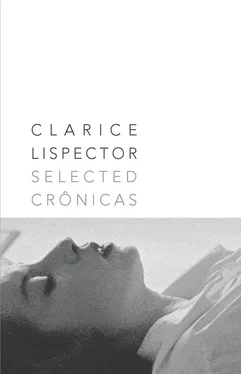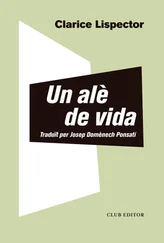Not without sorrow. In silence, I watched the sorrow of her awkward happiness. The lingering colic of a snail. She slowly ran her tongue over her thin lips. (Help me, her body said, as it painfully divided into two. I am helping, my paralysis replied.) Slow agony. Her entire body became swollen and deformed. At times, her eyes became pure eyelashes, avid as an egg in the process of being formed. Her mouth trembling with hunger. Then I almost smiled, as if stretched out on an operating table, and insisting that I was not suffering much pain. She did not lose sight of me: there were footprints she could not see, no one had passed this way before, and she perceived that I had walked a great deal. She became more and more distorted, almost the image of herself. Shall I risk it? Shall I give way to feeling? she asked herself. Yes, she replied to herself, through me.
And my first yes sent me into rapture. Yes, my silence replied to her, yes. Just as when my first son was born and I had said: yes. I had summoned the courage to say yes to Ofélia, I who knew that one can die in childhood without anyone noticing. Yes, I replied enraptured, for the greater danger does not exist: when you go, you go together, you yourself will always be there: this, this you will carry with you whatever may become of you.
The agony of her birth. Until then I had never known courage. The courage to be one’s other self, the courage to be born of one’s own parturition, and to cast off one’s former body. And without being told whether it was worthwhile. ‘I’, her body tried to say, washed by the waters. Her nuptials with self.
Fearful of what was happening to her, Ofélia slowly asked me:
— Is it a chick?
I did not look at her.
— Yes, it’s a chick.
From the kitchen came a faint chirping. We remained silent, as if Jesus had just been born. Ofélia kept on sighing.
— A tiny little chick? she confirmed, with some uncertainty.
— Yes, a little chick, I said, guiding her carefully towards life.
— Ah, a little chick, she said pensively.
— A little chick, I repeated, trying not to be unkind.
For some minutes now, I had found myself in the presence of a child. The transformation had taken place.
— It’s in the kitchen.
— In the kitchen? she repeated, pretending not to understand.
— In the kitchen, I repeated, sounding authoritarian for the first time, and without saying anything more.
— Ah, in the kitchen, said Ofélia, shamming and looking up at the ceiling.
But she was suffering. Feeling almost ashamed, I became aware that I was taking my revenge at last. Ofélia was suffering, shamming, looking up at the ceiling. Her mouth, those shadows around her eyes.
— Why don’t you go into the kitchen and play with the little chick?
— Me …? she asked slyly.
— Only if you want to.
I know that I should have ordered her to go rather than expose her to the humiliation of such intense desire. I know that I should not have given her any choice, and then she could say that she had been forced to obey. At that moment, however, it was not out of revenge that I tormented her with freedom. The truth is that this step, this step, too, she had to take alone. Alone and without delay. It was she who had to go to the mountain. Why — I wondered — why am I trying to breathe my life into her purple mouth? Why am I giving her my breath? How can I dare to breathe inside her, if I myself… is it only that she may walk, that I am giving her these painful steps? Am I only breathing my life into her so that one day she may momentarily feel in her exhaustion that the mountain has come to her?
Perhaps I had no right. But there was no choice. This was an emergency, as if the girl’s lips were becoming more purple by the minute.
— Go and see the little chick only if you want to, I then repeated with the extreme harshness of someone saving another.
We stood there facing each other, dissimilar, body separated from body; united only by hostility. I sat still and composed in my chair so that the girl might cause pain to some other being, unyielding so that she might struggle inside me; I felt increasingly strong as I saw Ofélia’s need to hate me, her determination that I should resist the suffering of her hatred. I cannot live this for you — my coldness told her. Ofélia’s struggle came ever closer and then inside me, as if that creature who had been born and endowed me with the most extraordinary strength, were drinking from my weakness. In using me, she bruised me with her strength: she clawed me as she tried to cling to my smooth walls. At last the words came out in simmering rage:
— I’m off to see the chick in the kitchen.
— Yes, off you go, I said slowly.
She withdrew hesitantly, conscious of her dignity, even as she turned her back on me.
She re-emerged from the kitchen immediately — she looked startled, shamelessly holding out the chick in one hand and examining me from head to foot in her bewilderment.
— It’s a little chick! she said.
She looked at the chick in her outstretched hand, then looked at me, then looked once more at her hand — and suddenly she became nervous and worried, which automatically made me feel nervous and worried.
— But it’s a little chick! she said, and reproach flickered in her eyes at once as if I had not told her what was chirping.
I laughed. Ofélia looked at me, deeply offended. And suddenly — suddenly she laughed. Then we both laughed, somewhat stridently.
When we stopped laughing, Ofélia put the chick down on the floor to see it walking. When it ran, she went after it. She seemed to be giving the chick its freedom in order to provoke desire, but if it cowered, she rushed to its aid, pitying it for being subjected to her power: ‘Poor little thing, he’s mine’: and when she held the chick, it was with a hand deformed by delicacy. — Yes, it was love, tortuous love. He’s very little and needs a lot of attention. One mustn’t fondle him for that could be really dangerous; don’t let people handle him unless they promise to be careful, and do as you think best, but corn is far too big for his little open beak; for he’s very fragile, poor little thing, and so tiny; therefore, you shouldn’t let your children play with him; I’m the only one who knows how to look after him; he keeps slipping all over the place, so the kitchen floor is clearly no place fora little chick.
For the last half hour I had been trying to get back to my typewriter in order to make up for lost time, while Ofélia’s voice droned on. Little by little, she was only speaking to the little chick, and loving for love’s sake. For the first time she had abandoned me, she was no longer me. I watched her, pure gold, and the chick, pure gold, and the two of them were humming like distaff and spindle. For me this also meant freedom at last and without any malice. Farewell. And I smiled with longing.
It was only much later that I realized that Ofélia was talking to me.
— I think — I think I’ll put him in the kitchen.
— Off you go then.
I did not see her leave, nor did I see her return. At a given moment, quite by chance and somewhat distracted, I realized that there had been silence for some time. I suddenly looked at her. She was sitting with her hands folded on her lap. Without quite knowing why, I looked at her a second time.
— What is it?
— I …?
— Do you want to go to the lavatory?
— I …?
I gave up and carried on with my typing. Some time later, I heard a voice:
— I must go home now.
— Of course.
— If you don’t mind.
I looked at her in surprise: Now then, if you wish …
Читать дальше












